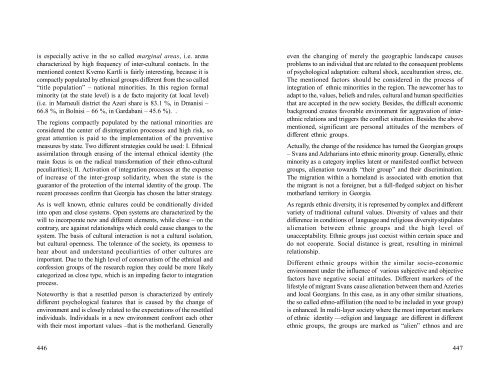socialuri usafrTxoebis eTnikuri aspeqtebi polieTnikur sazogadoebaSi
socialuri usafrTxoebis eTnikuri aspeqtebi polieTnikur sazogadoebaSi
socialuri usafrTxoebis eTnikuri aspeqtebi polieTnikur sazogadoebaSi
Create successful ePaper yourself
Turn your PDF publications into a flip-book with our unique Google optimized e-Paper software.
is especially active in the so called marginal areas, i.e. areascharacterized by high frequency of inter-cultural contacts. In thementioned context Kvemo Kartli is fairly interesting, because it iscompactly populated by ethnical groups different from the so called“title population” – national minorities. In this region formalminority (at the state level) is a de facto majority (at local level)(i.e. in Marneuli district the Azeri share is 83.1 %, in Dmanisi –66.8 %, in Bolnisi – 66 %, in Gardabani – 45.6 %). .The regions compactly populated by the national minorities areconsidered the center of disintegration processes and high risk, sogreat attention is paid to the implementation of the preventivemeasures by state. Two different strategies could be used: I. Ethnicalassimilation through erasing of the internal ethnical identity (themain focus is on the radical transformation of their ethno-culturalpeculiarities); II. Activation of integration processes at the expenseof increase of the inter-group solidarity, when the state is theguarantor of the protection of the internal identity of the group. Therecent processes confirm that Georgia has chosen the latter strategy.As is well known, ethnic cultures could be conditionally dividedinto open and close systems. Open systems are characterized by thewill to incorporate new and different elements, while close – on thecontrary, are against relationships which could cause changes to thesystem. The basis of cultural interaction is not a cultural isolation,but cultural openness. The tolerance of the society, its openness tohear about and understand peculiarities of other cultures areimportant. Due to the high level of conservatism of the ethnical andconfession groups of the research region they could be more likelycategorized as close type, which is an impeding factor to integrationprocess.Noteworthy is that a resettled person is characterized by entirelydifferent psychological features that is caused by the change ofenvironment and is closely related to the expectations of the resettledindividuals. Individuals in a new environment confront each otherwith their most important values –that is the motherland. Generallyeven the changing of merely the geographic landscape causesproblems to an individual that are related to the consequent problemsof psychological adaptation: cultural shock, acculturation stress, etc.The mentioned factors should be considered in the process ofintegration of ethnic minorities in the region. The newcomer has toadapt to the, values, beliefs and rules, cultural and human specificitiesthat are accepted in the new society. Besides, the difficult economicbackground creates favorable environment for aggravation of interethnicrelations and triggers the conflict situation. Besides the abovementioned, significant are personal attitudes of the members ofdifferent ethnic groups.Actually, the change of the residence has turned the Georgian groups– Svans and Adzharians into ethnic minority group. Generally, ethnicminority as a category implies latent or manifested conflict betweengroups, alienation towards “their group” and their discrimination.The migration within a homeland is associated with emotion thatthe migrant is not a foreigner, but a full-fledged subject on his/hermotherland territory in Georgia.As regards ethnic diversity, it is represented by complex and differentvariety of traditional cultural values. Diversity of values and theirdifference in conditions of language and religious diversity stipulatesalienation between ethnic groups and the high level ofunacceptability. Ethnic groups just coexist within certain space anddo not cooperate. Social distance is great, resulting in minimalrelationship.Different ethnic groups within the similar socio-economicenvironment under the influence of various subjective and objectivefactors have negative social attitudes. Different markers of thelifestyle of migrant Svans cause alienation between them and Azeriesand local Georgians. In this case, as in any other similar situations,the so called ethno-affiliation (the need to be included in your group)is enhanced. In multi-layer society where the most important markersof ethnic identity —religion and language are different in differentethnic groups, the groups are marked as “alien” ethnos and are446 447


